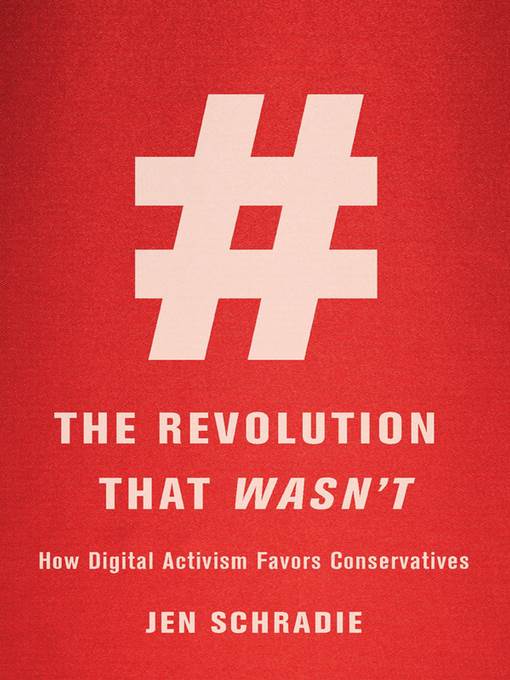
The Revolution That Wasn't
How Digital Activism Favors Conservatives
کتاب های مرتبط
- اطلاعات
- نقد و بررسی
- دیدگاه کاربران
نقد و بررسی

April 22, 2019
In this scholarly study of the 2011–2012 fight over public sector unionization in North Carolina, Schradie, a documentarian and activist turned sociologist, tests a central assumption of early internet theorists—that the supposed ease of digital activism would reinvigorate democracy and create a more inclusive, egalitarian marketplace of ideas—and finds that, instead, “digital activism has simply ended up reproducing, and in some cases intensifying, preexisting power imbalances.” She identifies three primary factors for this outcome: The members of working-class pro-union groups in North Carolina had less digital access, skill, empowerment, and time than their conservative counterparts. While conservative groups tended to embrace hierarchy and designate a skilled person to manage communication and publicity, progressive groups tended to manage tasks more collectively, leading to less effective communication. And conservative groups also tended to have a central, cohesive concept of individualist “freedom” that was successful in a right-wing media ecosystem, while left-leaning groups had sometimes competing ideas about how to define or achieve their central idea, “fairness,” which tended to lead to fragmentation. In the end, Pro-union groups in North Carolina failed to reverse the statute against public sector collective bargaining. Although Scobie’s conclusions have broader implications, the academic nature of this work will likely limit its appeal to sociologists, political scientists, and new media theorists.

April 1, 2019
Academic study of how contending political groups do--or do not--leverage digital media in their quests to recruit support and members. Focusing on the workers rights movement in the battleground state of North Carolina, documentary filmmaker and sociologist Schradie points out a great gulf in technological sophistication between left and right, with the former "having belatedly awoken to the notion that they were on the wrong side of a digital political divide that they weren't even aware existed." Part of the problem, writes the author in a book likely to appeal most to sociologists and aspiring digital activists, is that many working-class labor activists have neither the interest nor the resources required to master social media even as conservative activists manage to form themselves into "hierarchical organizations" with the money to buy computers and the people committed to getting their message out. Thus, Schradie suggests, the image the words "digital activist" should conjure is not of a left-wing student or labor activist but instead a well-heeled think-tank denizen or technologically adept tea party member. Though the latter groups tend to be well-funded, it's not only money that carries the day; it's that very hierarchical organization that seems central. Moreover, as Schradie observes, the decline of traditional journalism has come in an atmosphere in which rightward organizations such as Fox News and Breitbart have filled the vacuum even as left-leaning publications have struggled to find space in the cybersphere and funding to permit them to compete. "As a result," she notes, "digital evangelists were able to spread their anti-government message in sync with the convergence and ascent of social media, conservative news, and the Christian right." If they are to compete, leftist activists must do more to gain access to media and attain the skills necessary to put out a coherent message; if not, the gulf will only grow. A rather arid but useful work in the sociology of political communication.
COPYRIGHT(2019) Kirkus Reviews, ALL RIGHTS RESERVED.

























دیدگاه کاربران